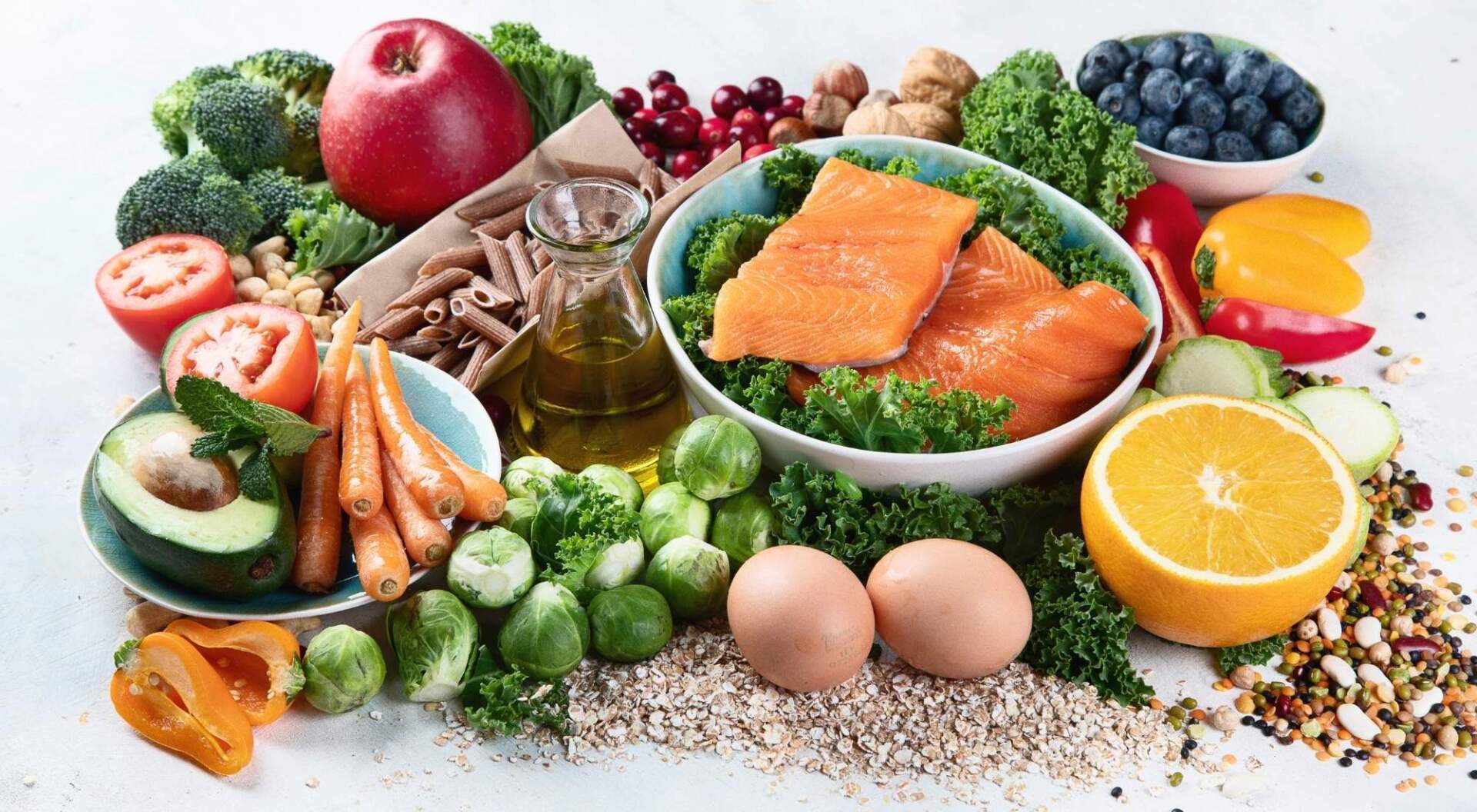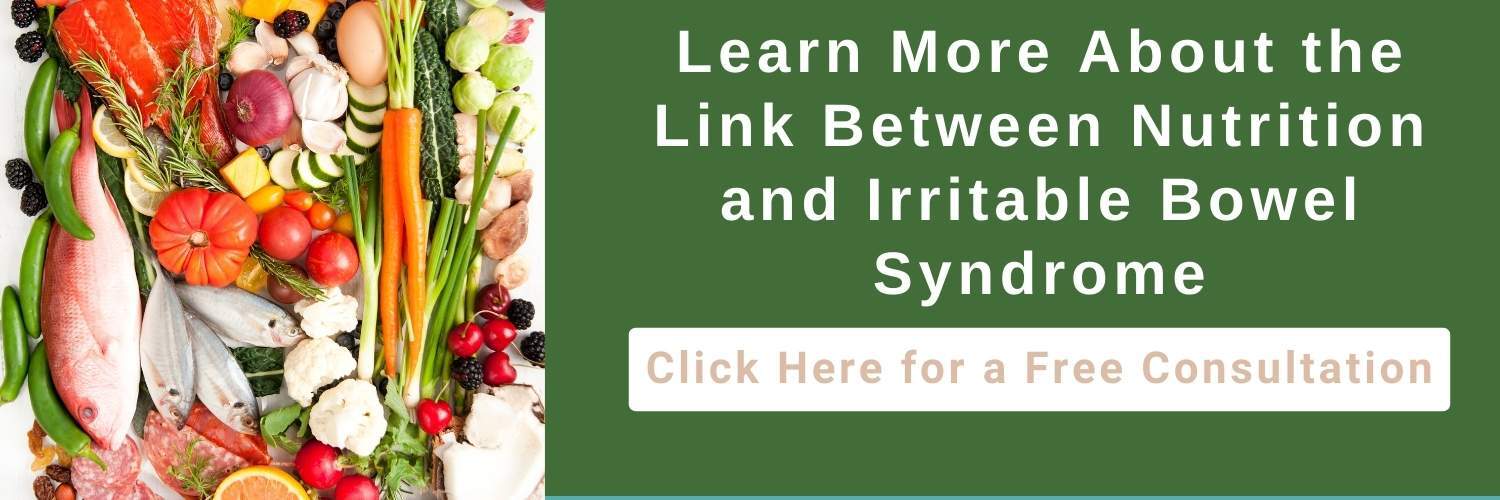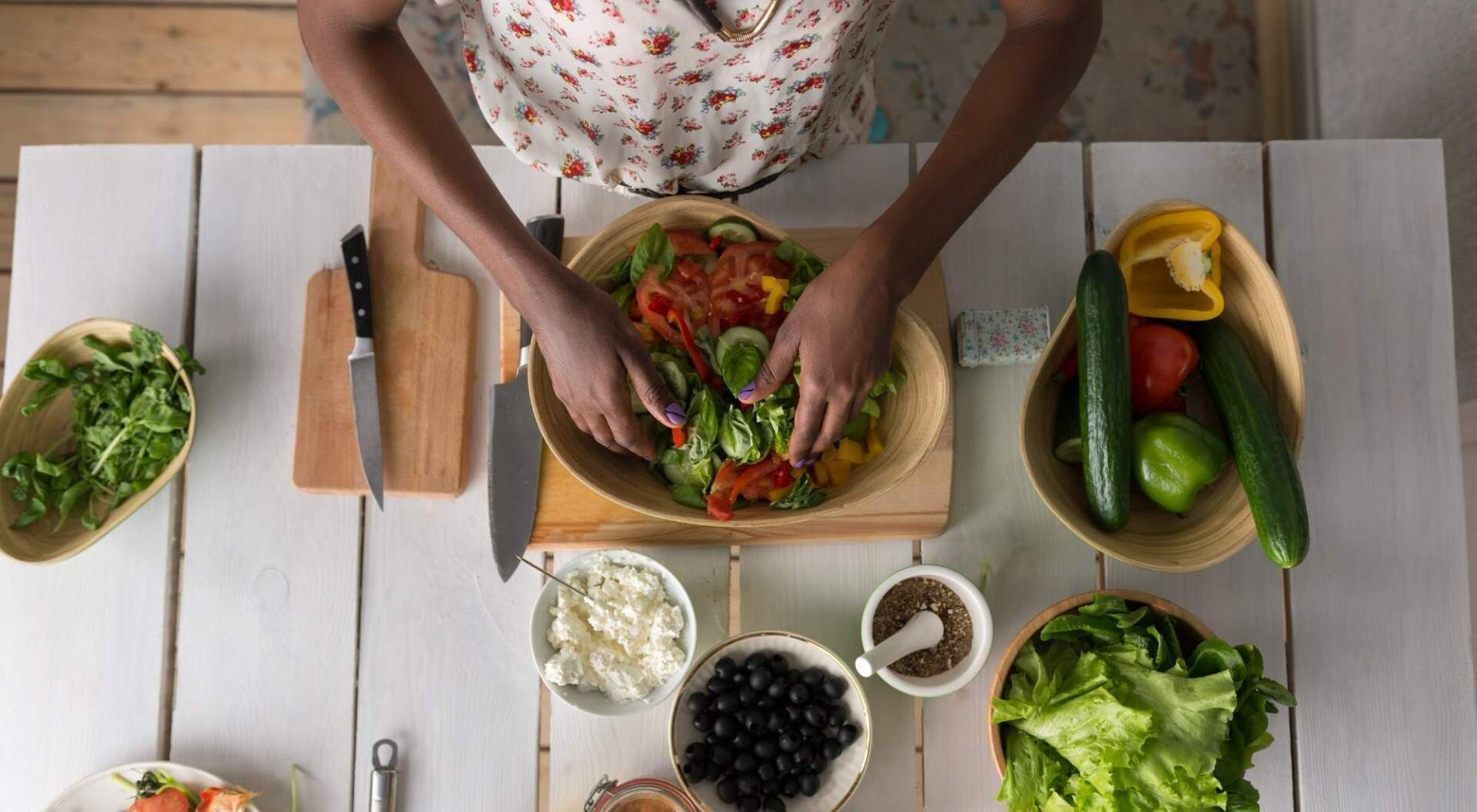IBS and Nutrition: Diet and Lifestyle Habits That Can Help Manage Your Symptoms
"The content below is not intended to be a substitute for professional medical advice, diagnosis, or treatment. Always seek the advice of your physician or other qualified health provider with any questions you may have regarding a medical condition."
Picture this:
You’re out to breakfast on a date and the coffee you ordered is served with creamer. Your eggs are also covered in melted cheese. You don’t want to seem like the annoying customer that sends their food back on the first date, so you hunker down and eat it.
Instead of listening to your date talk, your eyes are darting around the restaurant trying to locate the nearest restroom. You know you only have a short amount of time before the symptoms hit.
How inconvenient!
Irritable bowel syndrome is exactly that – inconvenient and irritating!
By learning what to avoid and what lifestyle changes to make, you can better manage your IBS symptoms. Read on to learn how changing your diet and lifestyle habits can help.
Table of Contents
IBS Diet Guide: 11 Food Tips to Help Ease Your Discomfort
Having a bad gut is unpleasant. You’re constantly:
- Restricting what you eat
- Running to the bathroom; and
- Nervous about being too far from home
If you suffer from irritable bowel syndrome (IBS), this probably sounds all too familiar to you. The…
- Constipation
- Diarrhea
- Gas
- Bloating; and
- Abdominal pain
… is affecting how you live your life.
Luckily, you can make simple changes for your digestive health by altering both your lifestyle and diet to control irritable bowel syndrome.
Interested in learning more? Through Nutrition Response Testing, Dr. Sergi at HealthierU can help you learn about the link between IBS and nutrition and help you with the process.
#1: Stay Hydrated
Dehydration is one of the top causes of irritable bowel syndrome with constipation (IBS-C). How does this work?
Constipation occurs when the stool in your colon becomes dehydrated. The stool begins to harden and dry, making it difficult to pass through the colon for a proper bowel movement.
By staying well-hydrated, your large intestine can pass water through the body, keeping your stools soft.
People who suffer from irritable bowel syndrome with diarrhea (IBS-D) may also experience dehydration from constantly using the bathroom without properly rehydrating.
Diarrhea can cause a major loss of water and electrolytes quickly, so if you’re experiencing more diarrhea than normal, don’t forget to rehydrate.
To prevent dehydration and IBS symptoms, limit or avoid:
- Milk
- Carbonated beverages
- Caffeine; and
- Alcohol
#2: Gradually Add More Fiber
Many believe that a common cause of IBS is an insufficient amount of fiber in a person’s diet. Gradually adding fermentable fiber, one that is readily fermented by bacteria that normally colonize the colon, can help relieve uncomfortable IBS symptoms.
Consider food options like:
- Sauerkraut
- Kombucha
- Kefir
- Pickles
- Miso
- Tempeh
- Raw cheese
- Yogurt
- Kimchi
- Apple Cider Vinegar
- Kvass
- Sourdough Bread
- Cottage Cheese
#3: Limit Caffeine Intake
Because caffeine generally increases the risk for diarrhea, it is often suggested to steer clear of food and drinks that contain this ingredient. This includes things like:
- Coffee
- Tea
- Soda; or
- Chocolate
#4: Cook Your Veggies
Although there is no clinical evidence that raw vegetables worsen IBS symptoms, many IBS sufferers complain about common IBS symptoms after eating them. Why could this be?
Raw vegetables require more work from your digestive system to break down the food and fibers. When cooked, the heat starts this process and your digestive system doesn’t have to work as hard.
Raw vegetables are often consumed in larger portions, like in a salad, which could contribute to the bloating and gassy feelings you experience afterward.
Try limiting raw…
- Broccoli
- Cabbage
- Cauliflower
- Brussels sprouts
- Leeks
- Asparagus
- Artichoke
… and instead, try:
- Green beans
- Eggplant
- Celery
- Carrots
- Spinach
- Sweet potatoes
- Yams
- Zucchini; and
- Squash
#5: Space Out Your Fruit Snacks
Many believe fruit to be a healthy food choice, but the sugar fructose is a contributor to IBS symptoms. In addition to monitoring which types of fruit you eat, space out fruit consumption every 2-3 hours.
Limit fruits high in fructose, like…
- Apples
- Pears
- Watermelon
- Stone fruits
- Dried fruit
- Fruit juice; and
- Concentrated fruit
… instead, try fruits lower in fructose, like:
- Bananas
- Blueberry
- Cantaloupe
- Cranberry
- Grape
- Oranges
- Kiwi
- Strawberry
- Lemon; and
- Lime
#6: Rule Out Celiac Disease
Oftentimes, people suffering from IBS are thought to be suffering from celiac disease. The two are very different.
Although both can cause…
- Abdominal cramping
- Diarrhea
- Gas; and
- Bloating
… those dealing with celiac disease have an immune system reaction to foods with gluten. It can also cause:
- Anemia
- Acid reflux
- Heartburn
- Itchy skin/rashes
- Blisters
- Tingly feet or hands
- Joint pain
- Headaches
- Damage to your teeth’s enamel; or
- Mouth sores
To be sure your symptoms are related to IBS and not celiac disease, visit your doctor for testing.
#7: Steer Clear of Sugar Alcohols
Sugar alcohols can have harsh side effects on your gut. Although they are neither sugar nor alcohol, this type of carbohydrate has a chemical structure very similar to sugar, stimulating the tongue’s sweet taste buds without adding extra calories to your food.
But the body isn’t designed to fully digest sugar alcohols, often leaving you with unpleasant stomach issues like:
- Abdominal pain
- Bloating
- Gas; and
- Diarrhea
Another small tidbit — sugar alcohols tend to have a laxative effect, lingering in the intestines and fermenting.
Common sugar alcohols include:
- Xylitol
- Erythritol
- Sorbitol
- Maltitol
#8: Go Easy on Gas-Producing Vegetables
If any food triggers gas for you, steer clear. Some common gas-producing vegetables include:
- Broccoli
- Cauliflower
- Cabbage
- Brussels sprouts
- Chickpeas
- Lentils; and
- Black beans
#9: Choose Easy-to-Digest Proteins
Proteins play an important role in your diet —from repairing muscles and tissues, making enzymes and hormones, and being an energy source. But too much protein, or proteins that are difficult to digest, can affect your IBS symptoms.
When choosing foods to control IBS, choose easy-to-digest proteins like:
- Eggs
- Chicken
- Turkey
- Fish
- Extra-firm tofu; or
- Plain lactose-free Greek yogurt
#10: Reduce Alcohol Intake
If you experience IBS symptoms while drinking alcohol, it might be best to abstain from drinking. However, here are some tips for drinking alcohol with IBS:
- Drink plenty of water to stay hydrated and help dilute the alcohol to make it less irritating to your stomach.
- Eat food to help protect your stomach from irritation.
- Drink slowly to give your digestive system time to process the alcohol.
You might also choose low-FODMAP alcoholic drinks to have less of an impact on your digestive system and IBS. These include:
- Beer (if carbonation doesn’t bother you)
- Whiskey
- Vodka
- Gin
- Red or white wine (if sugar doesn’t bother you)
#11: Identify Food Triggers with the Low FODMAP Diet
FODMAPs (fermentable oligo-, di-, monosaccharides, and polyols) are carbohydrates that are sometimes poorly absorbed and linked to digestive issues, like IBS. Following a low-FODMAP diet can help identify food triggers and avoid unwanted IBS symptoms.
Avoid foods like…
- Some fruits (apples, apricots, blackberries, canned fruit, cherries, dates, pears, watermelon)
- Sweeteners (honey, high fructose corn syrup, fructose, sugar alcohols)
- Dairy (ice cream, milk, yogurt, fresh cheese, sour cream, whey protein supplements)
- Vegetables (artichokes, asparagus, broccoli, brussels sprouts, cabbage, cauliflower, garlic, leeks, mushroom, onions, peas)
- Legumes (beans, chickpeas, soybeans)
- Wheat (biscuits, bread, cereal, crackers, pancakes, pasta, tortillas, waffles)
- Grains (barley, rye)
- Beverages (beer, fortified wine, soy milk, fruit juices, soft drinks, milk)
… and stick to low-FODMAP foods like:
- Meats, fish, and eggs
- Herbs and spices
- Nuts and seeds
- Fruits (unripe bananas, blueberries, cantaloupe, grapefruit, grapes, kiwi, lemons, lime, mandarins, melons, oranges, raspberries, strawberries)
- Sweeteners (maple syrup, molasses, stevia)
- Lactose-free dairy products and hard or aged cheeses
- Vegetables (Alfalfa, bell pepper, bok choy, celery, carrots, chives, cucumbers, eggplant, kale, lettuce, green beans, ginger, spinach, potatoes, squash, sweet potato, tomatoes)
- Grains (corn, oats, quinoa, rice)
- Beverages (water, coffee, tea)
6 Lifestyle Changes You Can Make Starting Today
An estimated 5-10% of the world suffers from IBS, many under 50 years old. Aside from being inconvenient, IBS can be unpredictable and triggered by many different things – what you eat, drink, and even do.
If you’re struggling with unwanted IBS symptoms, Nutrition Response Testing with HealthierU can help identify triggers and get you the relief you’re looking for.
But even though there is suggested
nutrition for IBS sufferers to follow and different treatments available, simple changes in your lifestyle can also help manage IBS symptoms.
#1: Use Low-Fat Cooking Methods
Because fats (9 calories per gram) are more than twice as calorie-dense as carbohydrates or proteins (4 calories per gram), they have a stronger gastrocolic reflex and can trigger IBS symptoms easier.
To avoid high-fat consumption, try using low-fat cooking methods like:
- Roasting
- Baking
- Broiling
- Steaming; or
- Sauteing
#2: Go For Smaller Portion Sizes
Remember, more calories mean a stronger gastrocolic reflex, so smaller portion sizes can help manage IBS symptoms.
When there is less food to digest there is less potential for:
- Bloating
- Cramps
- Gas; or
- Irritation
#3: Eat With Intention
Eating slowly and at regular intervals throughout the day helps your digestive system properly digest your food. By chewing your food thoroughly and eating with intention, you’re helping your digestive system do its job and process your food a bit easier.
#4: Try Taking a Probiotic Supplement
Probiotics, live bacteria or yeast, can help balance out your gut bacteria and improve your symptoms of IBS. Probiotics can help improve symptoms by:
- Inhibiting the growth of disease-causing bacteria
- Helping fight inflammation
- Reducing gas production
- Slowing down bowel movements; and
- Enhancing the immune system’s barrier functions
Although probiotics are found in many foods like…
- Yogurt
- Sauerkraut
- Tempeh
- Kimchi, and
- Other fermented foods
… they might affect your IBS symptoms.
A probiotic supplement may help improve symptoms like pain and bloating, reduce symptom severity, and help with bowel movements.
#5: Exercise Regularly
Because IBS is a brain-gut interaction, exercising to help the brain and body can help manage IBS symptoms.
Experts recommend simply doing something that you enjoy, but suggest:
- Yoga to improve digestion and mood
- Tai Chi to connect body and breath
- Walking to ease symptoms
- Cycling to vary your intensity; and
- Swimming for a full-body workout and mood booster
#6: Manage Stress and Anxiety
Often, people who worry about their health also have a psychiatric illness. When someone with a psychiatric illness, like anxiety or depression, worries often, they may experience health issues like:
- Upset stomach
- Muscle aches
- Irritability
- Dizziness
- Insomnia
- And more
There’s no surprise that if your stress and anxiety are high, your IBS symptoms might be out of control.
By better managing your stress and anxiety —whether through exercise, therapy, or medication— you may have a better handle on your IBS symptoms.
Discover the Right IBS Diet for You With Nutritional Response Testing at HealthierU
Living with irritable bowel syndrome symptoms is not only painful and irritating, it’s inconvenient for your daily life.
IBS makes it difficult to do normal day-to-day activities like go to work, exercise, or enjoy social time with your family and friends. You’re always worrying about what you will eat that might set off your symptoms and where the nearest bathroom may be.
Dr. Sergi, a nutritionist and chiropractor at HealthierU, can help you identify trigger foods and create a healthy diet for IBS symptoms.
Through Nutrition Response Testing, Dr. Sergi gets to the root of your digestive health and teaches you about the best foods for IBS relief based on your results.
Interested? Contact us today to get started!






